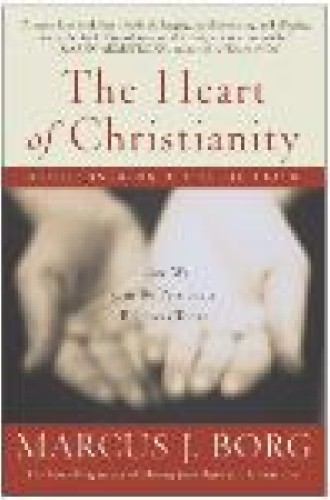Believing again
Marcus Borg has emerged as the Jesus Seminar scholar with the keenest theological sensibility and the most accurate read of the pulse of old-line U.S. Protestantism. His most recent book is a winsome, accessible, pastoral offering aimed at “making sense” out of Christianity for those who have been wounded or at least put off by the stereotypical absolutist, literalistic and moralistic church faith. Borg’s audience is that large population of churchpeople who are either so disaffected that they have left the church or who continue to come around but are profoundly alienated by what they sense in the church.
Borg offers a clear contrast between the older model of faith and the new paradigm he advocates—a paradigm marked by the terms “metaphorical” and “sacramental.” He assures the reader that many of the claims in the old model of faith are caricatures that do not need to be honored. Borg’s contrast between old and new paradigm is instructive and helpful. With generosity of spirit, he acknowledges that over time women and men of faith have been helped by both models, though at points the argument takes a somewhat Manicheistic tone whereby all the good claims are grouped in the new and all the bad claims are grouped in the old. Borg does not entertain the possibility that many people of faith “mix and match” across his paradigms in quite workable ways. He consistently draws a sharp and clean contrast.
The book’s title plays on the word “heart,” referring at the same time to the core of faith and the affective practice of loyalty and trust that constitutes the central part of faith. Borg develops the argument around three topics that preoccupy him: the Bible, which he understands in metaphorical terms rather than as a historical report; God as the “More” of reality without all the trappings of supernatural theism and its accompanying sense of requirement and judgment; and Jesus. He thinks christological language should be understood metaphorically, not as entailing hard metaphysical claims from an ancient time, claims that are profoundly difficult to accept in the postmodern world. The second part of the book concerns Christian life and practice, with the accent winsomely on newness and transformation.
Borg attests that he grew up in “the old paradigm,” and his book is an intimate account of how he has been able to embrace a healthier, more mature sense of gospel faith. Because of Borg’s personal sense of the issues, the book will be greatly helpful to those who are participating in the same venture toward health and maturity in faith. At the same time, however, one senses in Borg’s analysis the temptation to a rationalistic “either/or” characteristic of erstwhile literalists and those who have departed from fundamentalism.
In such a reading the Bible is either a human document or the divine word. God is either a demanding giver of requirements or a generous giver of transformative energy. Jesus must be seen either as a metaphor and sacrament of God or we are stuck with irrelevant formulae cast in impenetrable rhetoric. Such a simple sorting out of either/or (which Borg does with generosity toward claims that he rejects) seems to this reader not only unnecessary but misleading. It makes this book easy to critique by those who have an aversion to Schleiermacher and all such “soft” reassurances that may be offered to the “cultural despisers” of Christianity.
At the same time, The Heart of Christianity is easy to appreciate, and I am ready to celebrate it. Borg has rightly read the mood and need of much of the church; he provides a way for an important, positive and serious rethinking of the gospel in terms of the missional questions that are now before the church. The tilt of his argument seems to me to be on target, not as a full or final statement but as a discussion that is located in a precise slot. That slot is occupied by those who are on their way to a new, lively sense of the reality of the gospel. For others who have not been trapped in Borg’s “old paradigm,” perhaps he gives too much away. Thus the book needs to be taken for what it is: a clear, fairly simple articulation of the faith with none of the show-off elements too much in evidence in other spin-offs of the Jesus Seminar, and with echoes of John A. T. Robinson’s Honest to God. Many people will find this book an impetus for a venturesome rethinking, which is exactly what Borg intends it to be.





